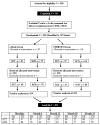Reproductive Health CHOICES for Young Adults with Sickle Cell Disease or Trait: Randomized Controlled Trial Outcomes over Two Years
- PMID: 26310871
- PMCID: PMC4769978
- DOI: 10.1007/s10897-015-9874-0
Reproductive Health CHOICES for Young Adults with Sickle Cell Disease or Trait: Randomized Controlled Trial Outcomes over Two Years
Abstract
Interventions to assist reproductive health decision-making in populations affected by sickle cell disease (SCD) or trait (SCT) lack proven efficacy over time. Our aim was to compare effects of CHOICES, a Web-based multimedia education program on implementing informed reproductive plans, and usual care education (e-Book) on reproductive knowledge, intention, and behavior over 24 months. We randomized 234 participants with SCD (n = 138) or SCT (n = 96) (age 18-35 years, 35 % male, 94 % African American) to CHOICES and e-Book groups. Participants completed a sickle cell-specific reproductive measure before and four times after the intervention (6, 12, 18 and 24 months). Compared to the e-Book group the CHOICES group had significantly more improvement in knowledge over time (p = .004) but not intention (p = .18) or behavior (p = .69). At baseline, 114 (48.7 %) participants reported having partners who would not put the couple at risk for their children inheriting SCD. Of the 116 (49.6 %) at-risk participants, a higher poroportion of those who were in the CHOICES group chose partners that reduced their risk by the last visit than the e-Book group (p = .04). Study findings provide important insights for designing a national trial of the CHOICES intervention focusing on subjects whose partner status puts them at risk for having a child with SCD.
Keywords: Longitudinal follow-up; Randomized controlled trial; Reproductive behavior; Sickle cell disease; Sickle cell trait; Young adult.
Figures
References
-
- Acharya K, Lang CW, Ross LF. A pilot study to explore knowledge, attitudes, and beliefs about sickle cell trait and disease. Journal of the National Medical Association. 2009;101(11):1163–1172. - PubMed
-
- Ajzen I, Fishbein M. Predicting behavior from intentions. In: Ajzen I, editor. Understanding attitudes and predicting social behavior. Englewood Cliffs, N.J: Prentice-Hall, Inc; 1980. pp. 46–52.
-
- Alayed N, Kezouh A, Oddy L, Abenhaim HA. Sickle cell disease and pregnancy outcomes: Population-based study on 8.8 million births. Journal of Perinatal Medicine. 2014;42(4):487–492. - PubMed
-
- Alswaidi FM, Memish ZA, O’Brien SJ, Al-Hamdan NA, Al-Enzy FM, Alhayani OA, Al-Wadey AM. At-risk marriages after compulsory premarital testing and counseling for beta-thalassemia and sickle cell disease in Saudi Arabia, 2005–2006. Journal of Genetic Counseling. 2012;21(2):243–255. - PubMed
-
- Asgharian A, Anie KA. Women with sickle cell trait: Reproductive decision-making. Journal of Reproductive and Infant Psychology. 2003;21(1):23–34.
Publication types
MeSH terms
Grants and funding
LinkOut - more resources
Full Text Sources
Other Literature Sources
Medical


